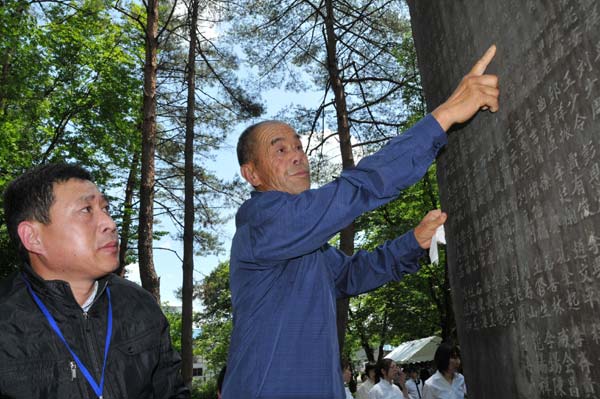 |
|
Song Mingyuan, the son of Song Jinde, a forced laborer from China, discovers his father's name on a memorial to those who died in a riot in Odate, Japan, on June 30, 1945. Photo by Wu Gufeng / Xinhua |
Japanese professor digs into truth of nation's past, Cai Hong reports in Tokyo.
Editor's note: History is, by definition, about past events, and while nothing can be done to change those events, forgetting them may lead to the wrong roads being taken in the future. During the coming months, China Daily will present a series of regular reports about ordinary lives during World War II and the continuing impact of the conflict on the present and the future. This is the second report in the series.
For Hiroshi Tanaka, money can teach history. In his case a 1,000 yen ($10) note printed in 1963 was the window through which the professor emeritus at Tokyo's Hitotsubashi University saw for the first time a chapter in the deliberately darkened room of Japanese history.
The note carried a portrait of Hirobumi Ito, who was Japanese prime minister four times - the first, fifth, seventh and 10th - and resident-general of Korea when the country was colonized by the Japanese.
Back in 1964 when Tanaka oversaw the living quarters of foreign students, one asked why Ito's portrait was printed on Japanese money. The question caught Tanaka by surprise because he had no idea that Ito's presence was an issue.
When he discovered the answer, Tanaka concluded that Ito's portrait on the note was inappropriate.
Ito was hated by many Koreans and was assassinated by An Jung-geun, a Korean independence activist, on Oct 26, 1909. In 1964, most of the foreign students in Japan were Korean. They had to use paper money bearing a portrait of a person they loathed. The banknote was in circulation until 1986.
"Why shouldn't Japan have taken the Koreans' feelings into consideration?" Tanaka asked, his conscience troubled.
As he researched the issue, his view of Japan's involvement in World War II was shattered.
Tanaka was born in 1937, the year Japanese troops committed the infamous Nanjing Massacre.
|
|
|
|
|
|
